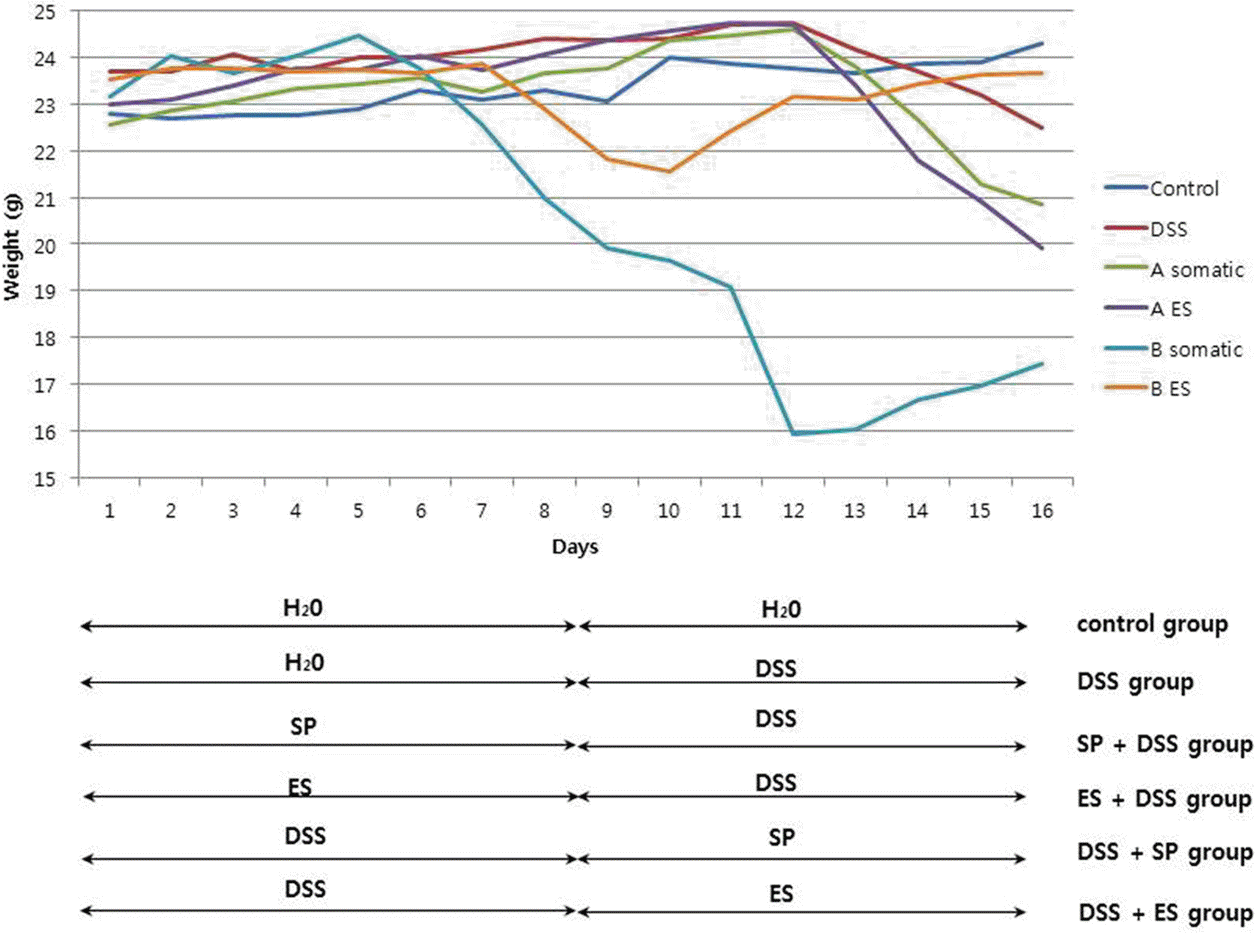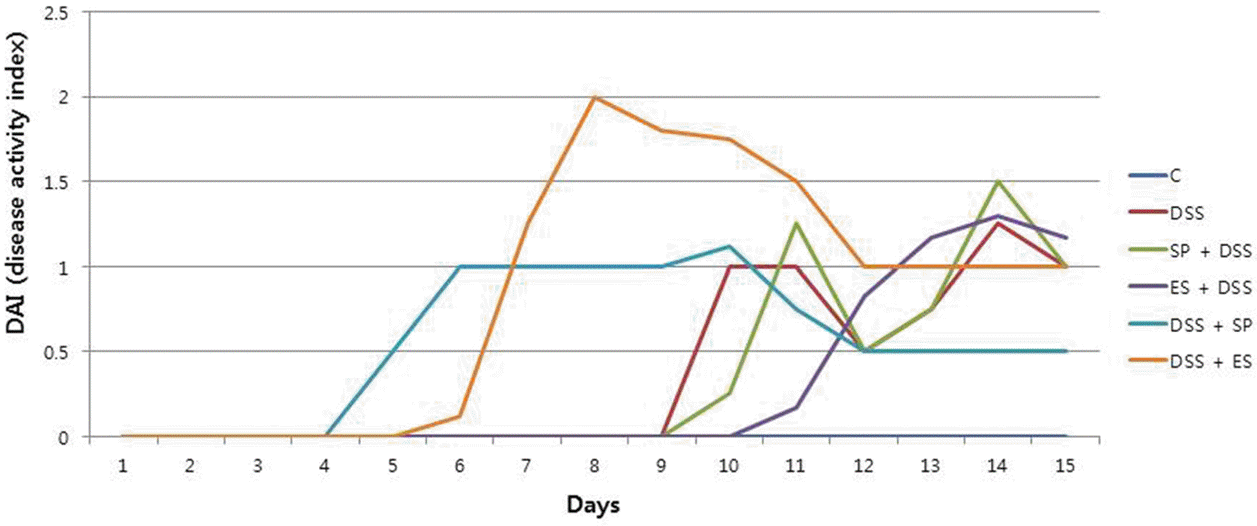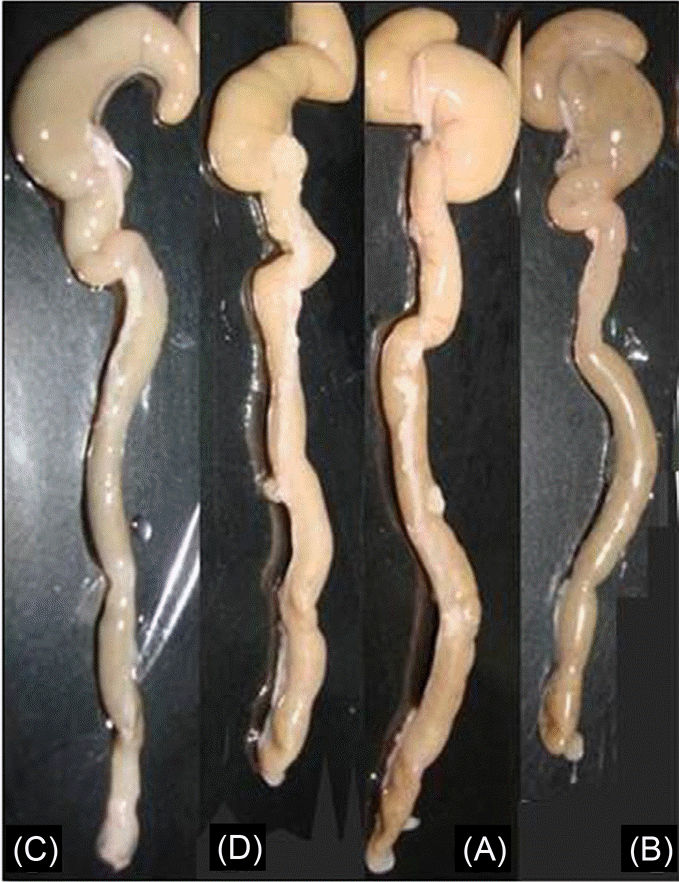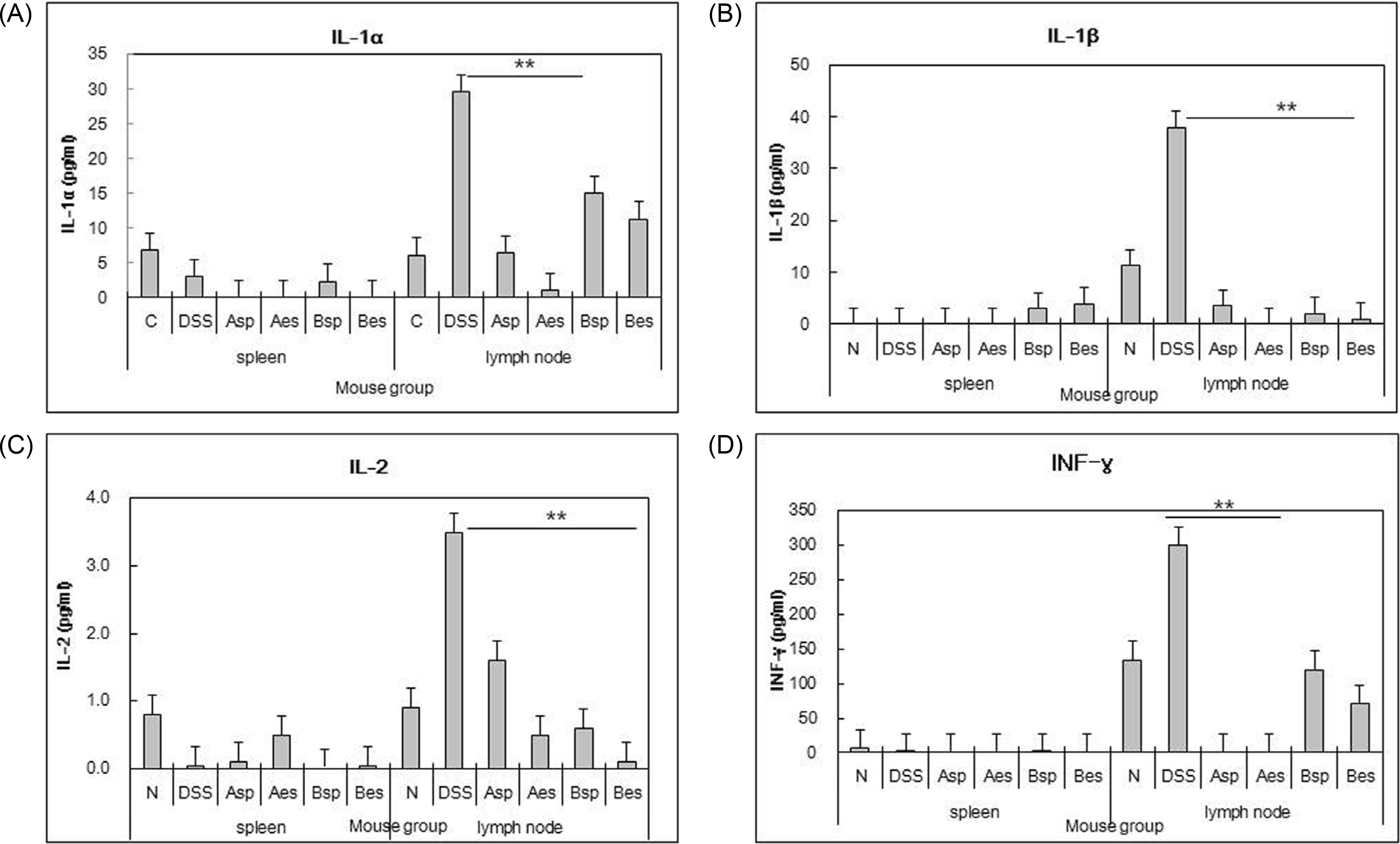Abstract
Objectives
Some helminths have been known to have a treatment effect in inflammatory bowel diseases, including Crohn’s disease (CD); however, live parasite therapy can cause unwanted side effects. To develop a safe therapeutic, we investigated the preventive or therapeutic potential of proteins from the third stage larva of A. simplex in a mouse model. We also analyzed the cytokine profile from splenic and mesenteric lymph node lymphocytes to elucidate the underlying immunological mechanism.
Methods
CD was induced in mice with DSS, and the effect of an A. simplex larval protein on CD was assessed. A change in body weight and DAI (disease activity index) were observed in mice. The expression levels of cytokines from mesenteric lymph nodes (MLN) compared to splenic lymphocytes were measured with ELISA.
Results
Peritoneal administration of preventive and therapeutic A. simplex larval proteins attenuated DSS-induced CD by a reduction of the DAI and weight loss. A shortening of colon length was more definitely observed in the therapeutic group than in the preventive group. The cytokine expression levels were more obvious in lymphocytes from mesenteric lymph nodes than from splenic lymphocytes.
Go to : 
REFERENCES
2.Yazdanbakhsh M., Kremsner PG., van Ree R. Allergy, parasites, and the hygiene hypothesis. Science. 2002. 296:490–4.

3.Weinstock JV., Elliott DE. Helminths and the IBD hygiene hypothesis. Inflamm Bowel Dis. 2009. 15:128–33.

4.Summers RW., Elliott DE., Urban JF Jr., Thompson RA., Weinstock JV. Trichuris suis therapy for active ulcerative colitis: a randomized controlled trial. Gastroenterology. 2005. 128:825–32.

5.Mortimer K., Brown A., Feary J., Jagger C., Lewis S., Antoniak M, et al. Dose-ranging study for trials of therapeutic infection with Necator americanus in humans. Am J Trop Med Hyg. 2006. 75:914–20.

6.Van Kruiningen HJ., West AB. Potential danger in the medical use of Trichuris suis for the treatment of inflammatory bowel disease. Inflamm Bowel Dis. 2005. 11:515.

7.Hsu S-J., Tseng P-H., Chen P-J. Trichuris suis therapy for ulcerative colitis: nonresponsive patients may need anti-helminth therapy. Gastroenterology. 2005. 129:768–9.

8.Cho MK., Ahn SC., Kim DH., Yu HS. Parasite excretory-secretory proteins elicit TRIF dependent CXCL1 and IL-6 mediated allergic inflammation. Parasite Immunol. 2010. 32:354–60.

9.Park SK., Cho MK., Park HK., Lee KH., Lee SJ., Choi SH, et al. Macrophage migration inhibitory factor homologs of Anisakis simplex suppress Th2 response in allergic airway inflammation model via CD4+CD25+Foxp3+ T cell recruitment. J Immunol. 2009. 182:6907–14.
10.Kim J., Jo JO., Choi SH., Cho MK., Yu HS., Cha HJ, et al. Seroprevalence of antibodies against Anisakis simplex larvae among health-examined residents in three hospitals of southern parts of Korea. Korean J Parasitol. 2011. 49:139–44.
11.Breese E., Braegger CP., Corrigan CJ., Walker-Smith JA., MacDonald TT. Interleukin-2- and interferon-gamma-secreting T cells in normal and diseased human intestinal mucosa. Immunology. 1993. 78:127–31.
12.Fuss IJ., Neurath M., Boirivant M., Klein JS., de la Motte C., Strong SA, et al. Disparate CD4+ lamina propria (LP) lymphokine secretion profiles in inflammatory bowel disease. Crohn's disease LP cells manifest increased secretion of IFN-gamma, whereas ulcerative colitis LP cells manifest increased secretion of IL-5. J Immunol. 1996. 157:1261–70.
13.Hommes DW., Mikhajlova TL., Stoinov S., Stimac D., Vucelic B., Lonovics J, et al. Fontolizumab, a humanised anti-interferon gamma antibody, demonstrates safety and clinical activity in patients with moderate to severe Crohn's disease. Gut. 2006. 55:1131–7.
14.Reinisch W., Hommes DW., Van Assche G., Colombel JF., Gendre JP., Oldenburg B, et al. A dose escalating, placebo controlled, double blind, single dose and multidose, safety and tolerability study of fontolizumab, a humanised anti-interferon gamma antibody, in patients with moderate to severe Crohn's disease. Gut. 2006. 55:1138–44.
15.Ruyssers NE., De Winter BY., De Man JG., Loukas A., Pearson MS., Weinstock JV, et al. Therapeutic potential of helminth soluble proteins in TNBS-induced colitis in mice. Inflamm Bowel Dis. 2009. 15:491–500.

Go to : 
 | Fig. 1.Changes in body weight in each group of mice. SP + DSS and ES + DSS groups are preventive groups; DSS + SP and DSS + ES groups are therapeutic groups. The average body weight was higher in the preventive groups than in the therapeutic groups. |
 | Fig. 2.DAI’s were measured daily during the experimental period in each group of mice. SP + DSS and ES + DSS groups are preventive groups; DSS + SP and DSS + ES group are therapeutic groups. |
 | Fig. 3.The representative colon from each group of mice. (C) control group, (D) DSS-treated group, (A) preventive group, (B) therapeutic group. The colons of the mice in the preventive group maintained their original length. |
 | Fig. 4.Cytokine profile of splenic and lymph node lymphocytes. Expression levels of IL-α (A), IL-1β (B), IL-2 (C), and IFN-γ (D) were measured with ELISA after administration of A. simplex protein. C; control, DSS; DSS only, Asp and Aes denotes preventive group injected with SP (somatic protein) and ES (excretory-secretory) protein. |




 PDF
PDF ePub
ePub Citation
Citation Print
Print


 XML Download
XML Download